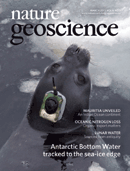Striking gold: Earthquakes deposit precious metal

The gold is formed when a tremor splits open a fluid-filled cavity in the Earth’s crust, causing a sudden drop in pressure, according to a team of Australian researchers.
This, in turn, causes the fluid to expand rapidly and evaporate, and any gold particles that had been dissolved in it to “precipitate almost immediately,” said a Nature press release.
“Repeated earthquakes could therefore lead to the build-up of economic-grade gold deposits.”
The researchers said much of the world’s known gold was derived from quarts veins that were formed during geological periods of mountain building as long as three billion years ago.
The veins formed during earthquakes, but the magnitude of pressure fluctuations or how they drove gold mineralization were not known.
For this study, researchers used a numerical model to simulate the drop in pressure experienced in a fluid-filled fault cavity during an earthquake.
In so doing, they answered a long-standing question about the world’s gold resources—how the metal becomes so concentrated from a highly dissolved state to a solid, mineable one.
The study said single tremors would not generate economically viable gold deposits, which were built up one thin coating at a time.
To form a 100-ton gold vein deposit would take less than 100,000 years, the team wrote.